Subscribe to ‘Words Of Hope’
Get our emails direct to your Inbox with updates about all our campaigns, trips and events.
“Looking around at this moment, the way women and girls’ rights are being rolled back around the world can feel overwhelming, like a tidal wave.” In light of continuing violence and rights violations worldwide, Amos’ Karin Joseph asks, where can we find hope in the fight for gender justice?
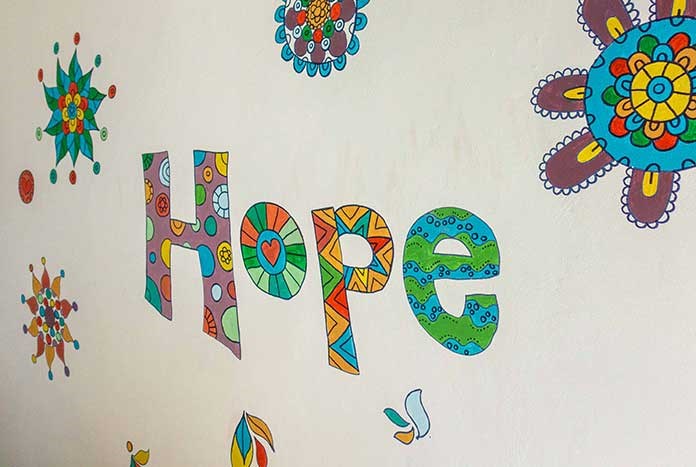
Small Moments of Hope
Karin Joseph writes about the need to pursue gender justice everywhere we work.
— — — — — —
On a Friday afternoon in September, a news alert flashed up on my phone — “Taliban ban girls from secondary school in Afghanistan”.
As time passed, more media outlets reported much of the same: Afghanistan has become the only country in the world to effectively prohibit half of its population from getting a secondary education. Whilst the move was hardly surprising, the reality unfolding was devastating to see.
And it would be wrong to suggest that by comparison, countries in the Global North are paragons of virtue when it comes to women’s rights. Women and girls’ bodily autonomy in Texas has been forced backwards as the state recently enacted a law to effectively ban all abortions, even in cases of rape.
Ordinary citizens can report anyone involved in helping a woman get an abortion — turning women’s bodies into a public courtroom for vigilante justice. Texan women may now understand some of what women in Nicaragua have been experiencing for years, where even medical abortions are outlawed.
Afghanistan has become the only country in the world to effectively prohibit half of its population from getting a secondary education.
And closer to home for me, the recent murder of Sabina Nessa has reignited the ongoing conversation about women and girls’ safety in the UK. At least every three days a woman dies at the hands of a man, and prosecutions for rape have reached a record low, with only 1 in 60 cases currently leading to a suspect being charged. A senior Met police detective has had the audacity to say in the media that “the streets are safe for women”.
Looking around at this moment, the way women and girls’ rights are being rolled back around the world can feel overwhelming, like a tidal wave. The horrific erasure of women and girls’ rights in Afghanistan leaves me feeling completely hopeless. I can’t imagine how it must feel to have to rip up or hide your hard-earned qualifications, watch your brothers head off to school, and stay inside indefinitely, all because of your gender.
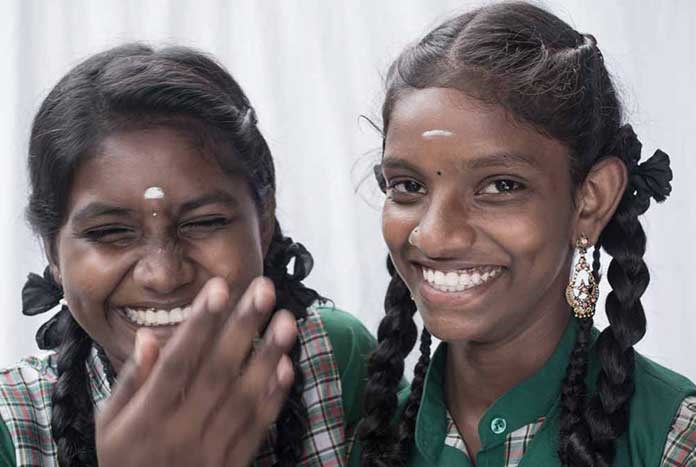
Education Education Education: Two friends from our partner Karunalaya in Chennai, India in their school uniforms. Image: © Tom Merilion
— — — — — — —
I can’t imagine having to make possibly one of the hardest decisions of my life and not continue with a pregnancy, knowing that I could be sued or imprisoned — all without any consideration or empathy for the reasons behind a very personal decision as a woman. I’m freshly reminded that even on a five minute walk before nightfall in London, myself, my female friends and relatives are still at risk of male violence, even when doing all that we are told to do to keep ourselves safe.
The common thread here is theft — of girls’ education and future, of their bodies, and even of their lives. The global picture does feel bleak. To me it feels bleaker than almost any moment I can remember. Worsened by the pandemic, the climate crisis and patriarchal ideas of women’s roles — women and girls’ choices, livelihoods and futures continue to be stolen from them.
I can’t imagine having to make possibly one of the hardest decisions of my life and not continue with a pregnancy, knowing that I could be sued or imprisoned.
Outrage isn’t enough; it doesn’t achieve much, and it’s exhausting. Wanting to do something about everything, so much that I end up struggling to do anything, can tie me up in knots. But refocusing my attention on the work Amos is involved in, reminds me that while we cannot do it all, what we are doing is vital.
Faith’s story
One story of hope that I heard earlier this month, from our partners in Tanzania, Cheka Sana, reminded me of this.
Earlier this year, Cheka Sana’s social workers met Faith*, a 15-year old girl who came onto the streets of Mwanza in 2020 who had become pregnant on the streets. After getting to know Cheka Sana’s workers and spending time in one-to-one sessions, Faith told them that she no longer wanted to be on the streets.
She shared some of the experiences she’d had; “I was beaten by adults on the streets and forced to have sex with men for money. I was also forced to wash dishes at ‘mama ntilie’ (local food vendors) in exchange for food. I also begged for money at bus stands. I had to stay out in the rain and cold.”
Cheka Sana’s team offered Faith various types of support. She received one-to-one psychosocial sessions, took part in peer mediation groups, and they helped her to access healthcare. They went with her to the maternity clinic and covered the delivery costs at the hospital when it was time for her to give birth. “Without Cheka Sana, I might have delivered my baby on the streets and I don’t know what would have happened.”
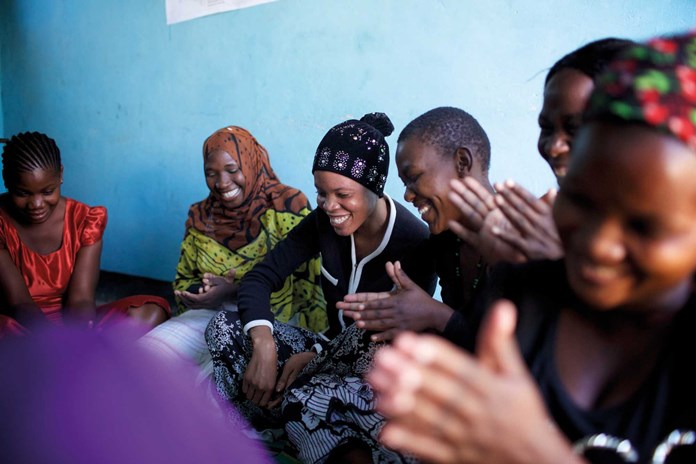
A Journey: Young women from Cheka Sana in Tanzania taking part in a peer mediation group. Image: © Christoph Stulz
— — — — — — —
Cheka Sana works with trained ‘fit persons’ — a foster care-style arrangement — to support children who are going through the process of reunification with a place to stay away from the streets whilst safely rebuilding relationships with family.
After a few months had passed, Faith gave birth to a baby boy by C-Section. She stayed with her temporary ‘foster’ family after giving birth, whilst continuing to reconnect with her family, after Cheka Sana helped her to reach out to her mother. Faith and her family are now reunited and being supported by Cheka Sana’s team, who are trained in supporting family integration; “I am grateful for the members of my family who are showing love to me and my baby”.
Cheka Sana’s team offered Faith various types of support. She received one-to-one psychosocial sessions, took part in peer mediation groups, and they helped her to access healthcare.
Faith’s story has a promising arc. Finally, she has some adults in her life who she’s been able to trust in — from the initial outreach workers who met her, to the ‘foster’ family she stayed with whilst having her baby, to the ongoing support she received from Cheka Sana’s team as she reconnected with her family, to the family members who haven’t turned her away and are showing her love and care.
I wouldn’t presume to say that this story will have a happy ending — because girls’ stories don’t end when the case study wraps up or she returns to her family. This journey is long and there may still be various bumps along the way. But there is hope in many of the moments in Faith’s story so far.
Radio 4 Appeal
Sunday 31st October
Amos is delighted to have secured our first BBC Radio 4 Appeal at the end of this month, which we will use to highlight the work of our partners Cheka Sana Tanzania. We are working with Cheka Sana as they support girls and young women on the streets through their StreetBorn project — which has a particular focus on young mothers and girls at risk of early pregnancy.
The Appeal is being presented by former Blue Peter and current Songs Of Praise presenter Diane-Louise Jordan, and will be broadcast on Sunday 31st October at 7.54am and 9.25pm.
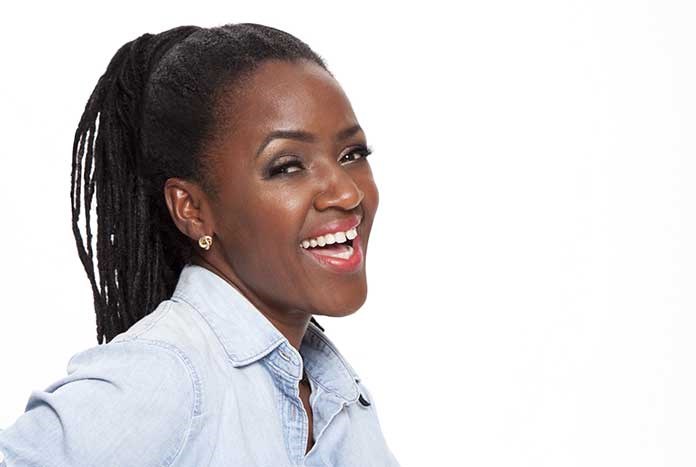
Former Blue Peter and current Songs Of Praise presenter, Diane-Louise Jordan.
— — — — — — —
Please, please let friends, family, church and community groups know about our Appeal, and use it as an easy way to invite new people to find out about the life-changing work we are all so proud to be involved in.
*name changed.
On Her Terms
When I joined Amos nearly four years ago, we started to develop the campaign that we felt captured what the team had been hearing and learning from our partners and their work with girls on the streets. Crystallising what needed to be said about girls and young women, their experiences, and the urgency of securing their rights was actually quite challenging — there was just too much to say, and probably always will be.
We came up with On Her Terms because it defined our hope for the lives of girls and young women on the streets, and it soon became clear that, as a phrase, it resonated so strongly with women everywhere. When we talked to our friends, our female supporters, our mums and our sisters, women who work at our partners — they immediately and instinctively ‘got’ why we had named it that.
A woman or girl anywhere in the world knows what it means (or dreams to know what it means), to be able to live life on her terms. And every woman or girl has experienced the opposite at some stage.
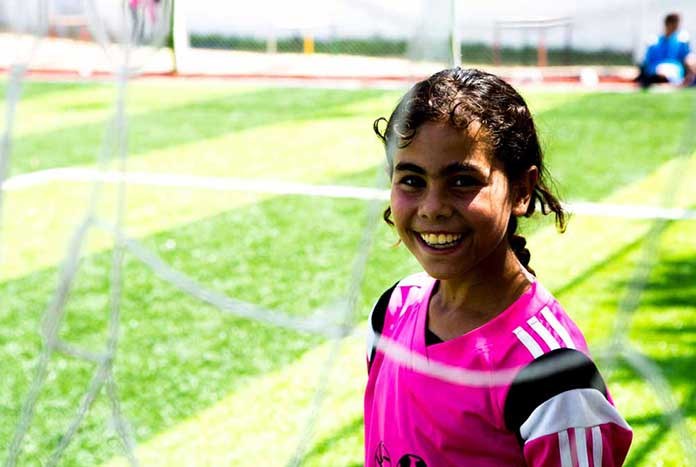
Football Crazy: A young girl in Gaza on the football field. Image: © Mark Kensett
— — — — — — —
It is not a simple picture in which only a woman or girl’s gender matters: if she is poor, from the Global South, has a disability, is of a minority ethnicity or religious group, or is a part of the LGBT community — the odds can be even more stacked against her.
We came up with On Her Terms because it defined our hope for the lives of girls and young women on the streets, and it soon became clear that, as a phrase, it resonated so strongly with women everywhere.
It’s so important for us to have an intersectional approach to all of our work as we think about gender justice in vastly different locations around the world: gender justice for a woman in Nicaragua will look different to that for a girl in Gaza. And working for an organisation in the Global North we also need to continually remember our own privileges, and that while all injustice is connected, any of my experiences of misogyny as a woman in London will differ vastly from those of a young woman on the streets of Durban, for example. We’re committed to listening — especially to women and girls — learning, supporting women’s leadership, and amplifying their voices.
Gender Justice = Climate Justice = Palestine Justice
Over the last few years, the majority of what you will have heard about Amos’ work with girls and women has likely been as part of our On Her Terms campaign. However, the reality is that everywhere we work, injustice is experienced by women and girls because of their gender. As such, Amos will be focussing more on gender justice across all areas of our work — how it connects to our calls for climate justice, and also what gender justice looks like in Palestine.
All of our partners already work to advance gender equality, and we will be talking more about this moving forward. For example, in Nicaragua, our partner CEPAD invests heavily in the capacity-building of women in communities to build their resilience in the face of a changing climate: rural women are some of the most affected by the climate crisis, and often have the least resources to respond. And in Bethlehem, our partner Holy Land Trust (HLT) recently completed a project recording and sharing the stories of Palestinian women who had lived through so many wars and uprisings.
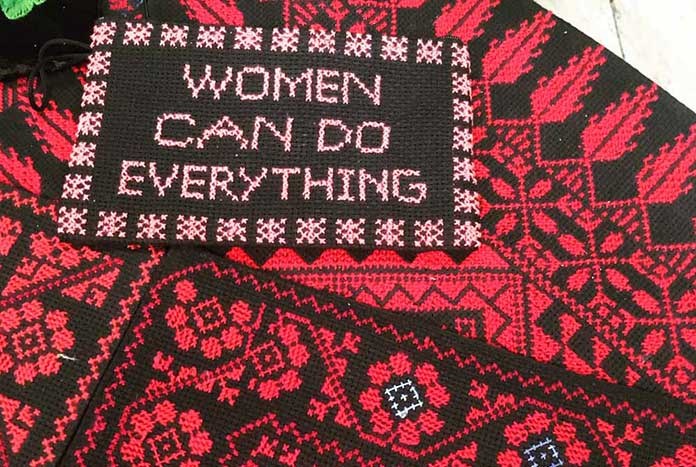
Women Can Do Everything: Amos will be focussing more on gender justice across all areas of our work — how it connects to our calls for climate justice, and also what gender justice looks like in Palestine. Image: © Jess Foster
— — — — — — —
As Lara Mitri from HLT explained, “We were recently saddened by a series of incidents of violence against women. This phenomenon has nothing to do with the character of the Palestinian people, and is not linked to its customs, traditions, respect and appreciation for women.
(As such,) Amos will be focussing more on gender justice across all areas of our work — how it connects to our calls for climate justice, and also what gender justice looks like in Palestine.
The woman is the land, the grandmother, the mother, the sister, the mother of the fighting captive, and the womb of the revolution throughout our honourable history. The role of Palestinian women is not a secondary role in all aspects of life, and they are influential in decision-making. We planned this project to highlight the role of women in history-making from a feminist point of view, to display feminist history through the stories of women of different times.”
We Do Hope
I started writing this article on a Friday afternoon, scrolling through news alerts on my phone about an entire nation of girls’ futures being stolen from them. It was a moment where, to me, hope felt in short supply. I currently still struggle to see any hope in the situation for Afghan women; it feels trite to look for any kind of hopeful spin. However, I’m reminded daily how glad I am that I do get to hear about, and talk about, moments of hope, through the work we are involved in at Amos.
Hope is found in the moments when girls can recognise their own worth and value. It’s found in their relationships with dedicated workers who reach out and build trust with them when everyone else has let them down. Hope can be seen when young women, who’ve lived on the streets for years, feel ready to move away from the streets and live independently.
I started writing this article on a Friday afternoon, scrolling through news alerts on my phone about an entire nation of girls’ futures being stolen from them.
It can be found in the work of Al Ahli Hospital, helping Gazan women diagnosed with breast cancer to overcome the odds. And hope is evident in the leadership of young women like Immaculate Akello, a lawyer and entrepreneur who is fighting against the impact of the climate crisis on rural women in Northern Uganda; we will be hearing from Immaculate as well as other female climate activists on Amos Day on 9th October.
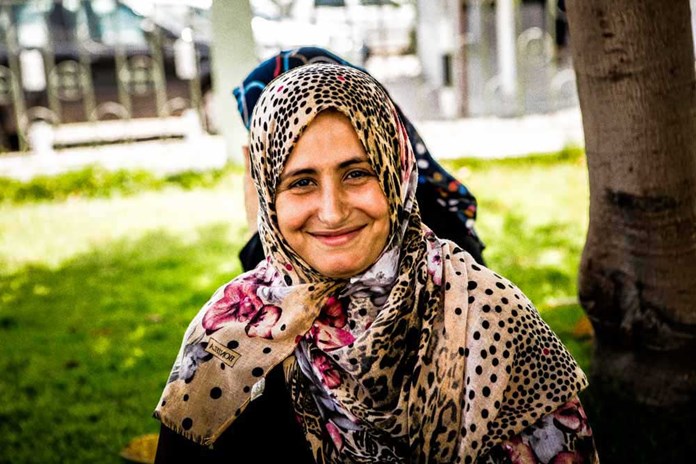
Hope: Women from Al Ahli Arab Hospital in Gaza City help other women who have been diagnosed with breast cancer. Image: © Nick Welsh
— — — — — — —
A reflection on hope that I love and come back to at moments like this is from writer and activist Rebecca Solnit:
Hope is not a lottery ticket you can sit on the sofa and clutch, feeling lucky. It is an axe you break down doors with in an emergency. Hope should shove you out the door, because it will take everything you have to steer the future away from endless war, from the annihilation of the earth’s treasures and the grinding down of the poor and marginal... To hope is to give yourself to the future — and that commitment to the future is what makes the present inhabitable. Rebecca Solnit
What you could do next
More First Of The Month
Older editions of our First Of The Month essays are available to read and download here.
Words Of Hope E-news
Sign up to receive our regular ‘Words Of Hope’ emails and keep up to date with all the latest Amos news and information, including details of our trips and events, news from our partners around the world and all of our campaigns.
Online reflection
Join us every Tuesday at 5pm for ‘Words Of Hope’ — our online reflection. Simply click here to join us a few minutes beforehand.
Amos Trust
7 Bell Yard, London
United Kingdom
WC2A 2JR
Telephone:
+44 (0) 203 725 3493
Email:
[email protected]
Registered Charity No.
1164234

This item has been added to your shopping basket. Please click on the Checkout button below where you can choose your quantity.
Continue shopping Checkout Close